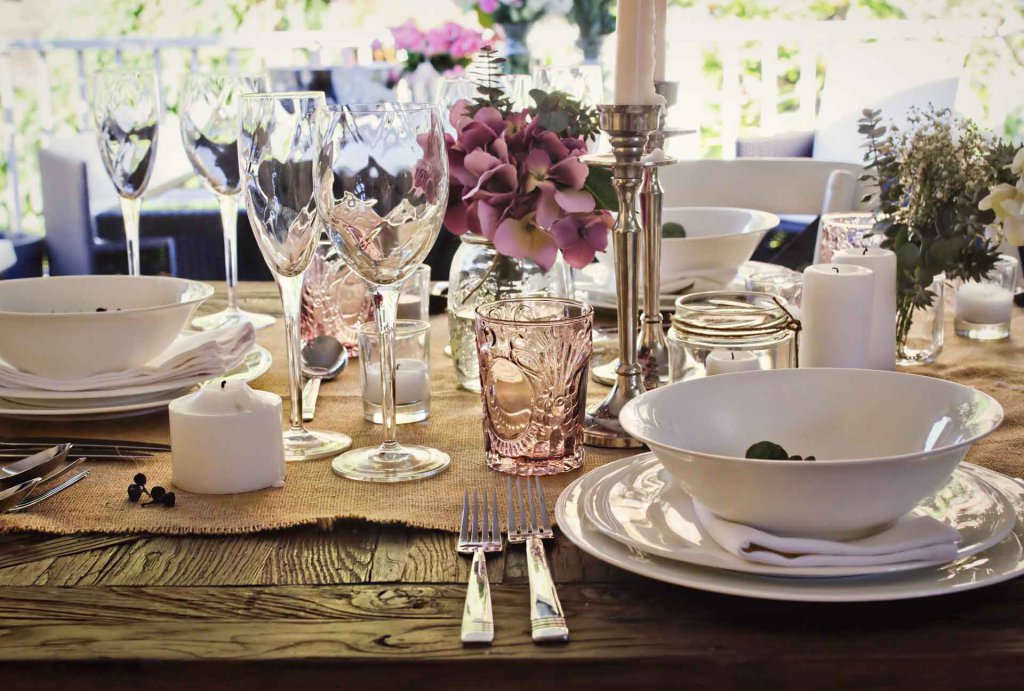You have done the best you can with the guest list, styling, food and drink and these are the basic necessities for making a good dinner party, but how about making it the excellent dinner party that everyone will really, really enjoy?

The answer is simple, good conversation, one that flows easily and naturally around the whole table, sometimes funny, sometimes thought provoking but always lively. Prolonged silence is your enemy, so have a few weapons in your arsenal to keep it away from your table.
1. A happy host
As the host you will be responsible for the mood and tone of the occasion, so keep it light, complimentary and charming through your body language and tone of voice. A happy host will have happy guests, but just imagine how they would feel if you are touchy, nervy or overbearing – very unhappy indeed is my guess!
2. Facts at your fingertips
Do your homework and have some ready facts at your fingertips about your guests. People usually find it easy to talk about themselves, after all it is the subject they know the most about, so before they arrive think about each one and what are their interests, family situations, occupations etc. This will have several benefits, to match strangers during the introductions, to draw out quieter characters or to rein in a known bore by avoiding his or her pet hobby horse! You could always be ready with a flattering anecdote about each one to fill any gaps in the conversation.
3. Conversation starters
Start a conversation by having a few topics up your sleeve that most people will be able to join in with, such as local news, music, fashion, sport (but be careful with this, in case of obsessive fans) TV or current events. You can start buy offering an observation such as ‘I’ve been hooked on Masterchef this week, who do you think will be the next one to be knocked out?’ or ‘I saw that they are opening a new gym next to the cinema, does anyone know any details’
4.Questions as openers
Another way to start is by throwing some questions into the mix. Try to keep these open ended and best to stick to safe ground that will not cause offence or make your guests feel they have shown up for an interview rather than a social occasion. For example, don’t just say ‘Have you been on holiday this year at all?’ as this could elicit a straight ‘Yes’ or ‘No’, better to say ‘Tell us about your latest travels’ or better than ‘What do you do?’ would be ‘ How did you come to be in your line of business?’
5. Keeping the topic going
Questions can also be used to great advantage in keeping a topic going, by saying ‘That sounds really interesting, can you tell us more?’ or ‘How did you come across that?’ ‘ Did they realise that might happen?’ and ‘Oh no, how did you get out of that one?’ as well as the old favourite ‘Does anyone else know about this?’

6. All contributions
It can be interesting to have some unusual statements to hand with the idea that everyone gets to contribute in turn. For example, ‘My favourite place is……’ ‘The best thing I have ever done is……….’ ‘I absolutely hate ……’
This works well when everyone is at ease in each others’ company but has the potential to be embarrassing, so judge carefully whether it is right for this particular group. You can always adapt it so that it is not a turn taking exercise but simply offer the opportunity to contribute, that would avoid the ‘can’t think of anything, help!’ or folk having to fill in with something they know will bore the pants of everyone else just for the sake of saying something.
7. Trivia cards
Sometimes you can introduce trivia quiz cards between courses whilst you put last minute touches to things in the kitchen. This can be lots of fun and get everyone going in trying to answer, though you will need a good person to act as question master to avoid too much shouting or showing off.
8. Careful placing
Place your guests sensitively so that nobody is at a huge disadvantage because of whom they are sitting beside. It is often a good idea to place a person with a tendency to overpower the conversation next to you so you can keep them in order if necessary. Or place the shy guest next to a kindly one who will be able to draw them out and match up a newcomer with a friendly soul. It has been said that if you have two vociferous guests, place them opposite each other towards the centre and they will draw the conversation towards them, but that could be a bit risky and you might end up with everyone else retreating into the background. It just depends on all the personalities around the table.
9. Let others do the talking
When it is your party, it is easy to feel that you must always take centre stage in making sure everyone has a good time, but whilst you are responsible for what takes place at your table it doesn’t mean that you have to do all the talking. It is very unlikely that all of your guests will be shy, not know anybody or generally need their hands holding! Most people will be very chatty and enjoy the company, so be brave, sit back and let them. You will soon know when there is a need to intervene with a specific strategy, otherwise let it all happen and join in with the fun.
10. A single conversation
There are some hosts who like the whole table to be included in a single conversation rather than let several develop as the evening gets underway. This is a matter of personal preference and whilst it can work superbly, it needs more managing. Guests will need to be drawn in from all around the table by clever commenting or questioning and it has the disadvantage of only one person being able to speak at any one time thus some may feel a little sidelined and be tempted to set up in opposition with their neighbour, albeit on the same topic!
Good conversation is something to be prized and it will take your dinner party to a whole new level. The clock will tick by so fast that nobody realises how time has flown by because they will all have had such a good time. It will not happen by accident, you will need to have a hand in things by following some of our top tips but with a clever lead from you, others will surely follow and you can be sure of a lively buzz at your table.
Oh, and keep the glasses topped up, that always helps.